CELEBRATING SUCCESS
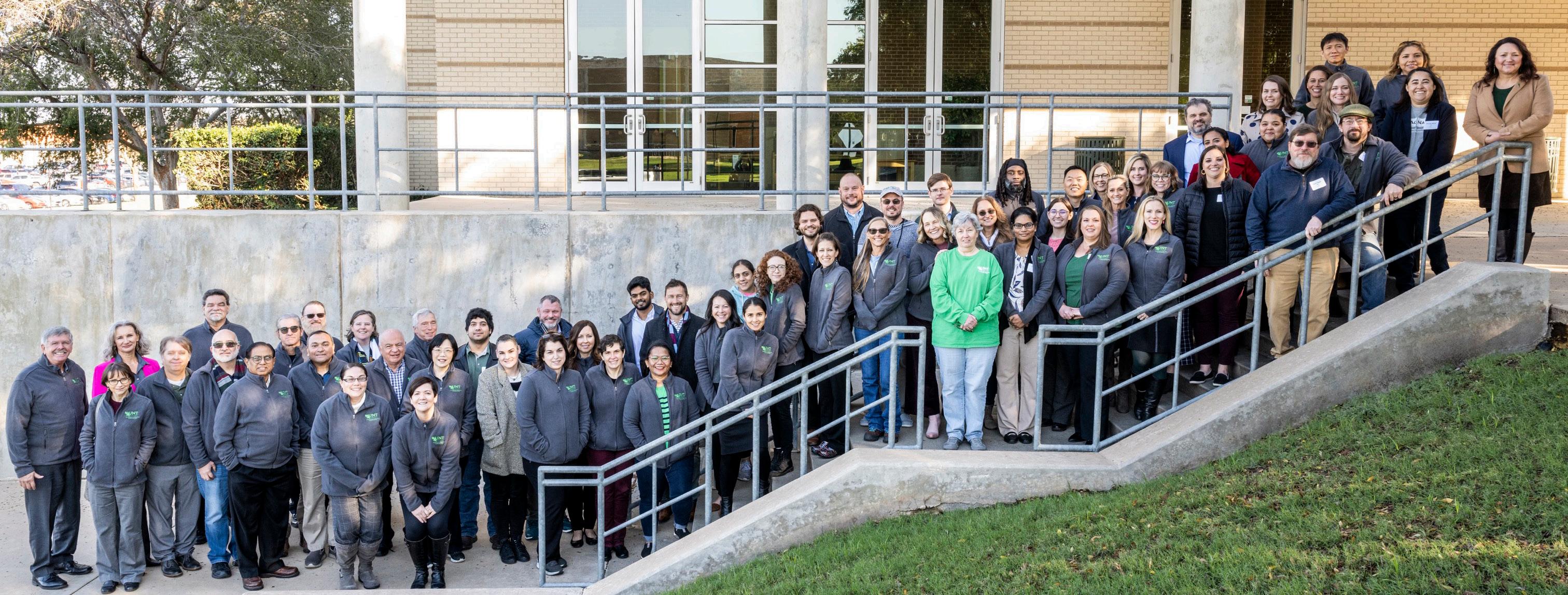
Research at UNT is soaring due to the consistent efforts and accomplishments of the faculty, staff, and students. We truly had a historic year at UNT with securing over $86 million of sponsored project awards from top national agencies such as the U.S. Department of Defense, U.S. Department of Education, National Institutes of Health and the National Science Foundation. We saw another year of research growth, both in external research revenues and in other measures of impact, with a broadening and acceleration of accomplishments and productivity across all sectors of the campus.
I am honored to highlight faculty, staff, and student accomplishments that showcase successes and achievements throughout this last year. As an inaugural recipient of awards from the NSF’s Regional Innovation Engines program, as well as NASA’s initiative to support Minority-Serving Institutions in their work to further strengthen academic offerings in STEM, UNT is bolstering its national reputation in research and support of students. Our researchers across disciplines are making tremendous strides in their fields through discovery, impacting the workforce of Texas, and supporting the social mobility of students. These accomplishments could not have been achieved without the dedication and persistence within the UNT community.
We continue to solidify our standing as a Carnegie 1 Research University and a Hispanic Serving Institution (HSI). Each year, the U.S. Department of State’s Bureau of Educational and Cultural Affairs recognizes the strong engagement of select HSIs with the Fulbright Program, the U.S. government’s flagship international academic exchange program. This year, UNT was named as a Fulbright HSI Leader for 2023 – another indicator of the successes at UNT.
Foundational to the success of the researchers at UNT are the supportive and dedicated research staff that facilitate the sponsored project proposal, award, compliance, and intellectual property process. I am honored to lead an amazing team of individuals that serve the researchers at UNT. While it is my job to highlight these successes, each of us own them. So, again, thank you for the amazing work that has made all this possible.
Pamela Padilla, Ph.D.
Vice President for Research and Innovation
1
Photo by Ahna Kubnik
DIVISION OVERVIEW
The mission of the Division of Research and Innovation reflects a commitment to serve and support the faculty and staff, and students at UNT with a primary purpose of collectively enhancing research. The core values outline the focus of the division’s employees as driven and committed team members.
Mission
The mission of the Division of Research and Innovation is to support, facilitate and empower the growth of sustainable research at UNT.
Core Values
• Integrity — Committed to creating knowledge with a high degree of honesty and accuracy
• Interdisciplinary Focus — Focused on the development of solutions requiring complex multidisciplinary approaches
• Partnerships — Dedicated to building connections in teams focused on solutions to society’s biggest challenges
• Innovation — Committed to identifying and supporting new and creative approaches
Hispanic Serving Institution (HSI)
• Efficiency — Dedicated to the strategic and focused use of resources
• Individual Growth — Focused individuals in and of themselves as part of multidisciplinary teams
• Diversity — Committed to empowered decision-making and the inclusion of talented individuals from a variety of different backgrounds
The University of North Texas, with nearly 47,000 students, it is the third largest university within Texas. It is also one of twenty-one Tier One Research and Hispanic Serving Institutions (HSI) in the nation and region of the country that has a growing diverse community. Centering the strengths of UNT as an R1/HSI, we build an academic and research workplace as a place of belonging that will have positive impact over students, faculty, and staff through research and innovation every year. UNT is at a pivotal moment to become a national model for large state institutions and HSIs that support research and innovation to move fields and practices forward and better prepare the future workforce.

2

Strategic Planning and Implementation
STRATEGIC PLANNING
The Division’s goals focus on increasing UNT’s research enterprise by building capacity and researcherfocused infrastructure that supports discovery, innovation, commercialization, creativity, and interdisciplinary research conducted with integrity. Our strategy includes informative research development programs, communication of research opportunities and faculty successes, and seamless operational processes and trainings that support externally funded research conducted in a secure and compliant manner.
BY THE NUMBERS
UNT Profile Table
Number of Sponsored Project Proposals 637
Sponsored Project Proposal Amount $298,655,878
Number of Sponsored Project Awards 317
Sponsored Project Award Amount $87,042,942
Sponsored Project Expenditure Amount $48,379,585
Restricted Research Expenditures Amount $31,288,590
Total Research Expenditure Amount $105M
Total Number of Faculty 1,217
Graduate Student Headcount (Spring 2023)
Staff
UNT Sponsored Awards FY2020 – FY2023
4
0 10 20 30 40 50 60 70 80
Fiscal Year 2023
FY2023 FY2022 FY2021 FY2020 $3M $5M Public Service Research Instruction $79M $3M $5M $33M $40M $33M $1M $5M $1M $8M
32,836
11,500 Undergraduate Student Headcount (Spring 2023)
Number
90 100
within Division of Research and Innovation 76
BY THE NUMBERS
UNT Research Awards by Source FY2023
Federal: $67,722,428
Private: $5,751,892
State: $5,847,575
4 Total Research: $79,321,895
3 Represents the percentage of the total amount of awards by funding source. Does not include Public Service or Instructional funding.
UNT Research Awards by Sponsor FY2023
United States Department of Defense
National Science Foundation
Texas Workforce Commission
U.S. Army Research Laboratory
State of Texas
National Institutes of Health
U.S. Department of Energy
3 Represents the percentage of the top seven sponsors.
5
85.38% 7.37% 7.25%
26.04% 16.68% 13.41% 13.17% 10.71% 10.25% 9.73%

Notable Awards and Financial
Disclosures
PRINCIPAL INVESTIGATORS – NOTABLE AWARDS
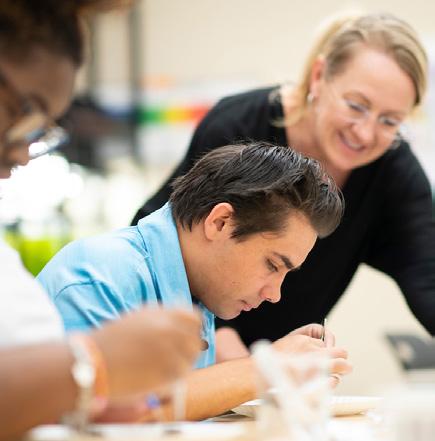
COLLEGE OF HEALTH AND PUBLIC SERVICE
Lucy Gafford, Director of UNT WISE
University of North Texas Workplace Inclusion & Sustainable Employment (UNT WISE), in collaboration with Texas Workforce Commission (TWC), are using the $12.7 million grant from the Department of Education (ED) to educate employers who use subminimum wage contracts about the benefits of competitive, integrated employment for people with disabilities. The partnership creates the Texas Beacons of Excellence (TBE) to help employers enhance their skills in recruiting, retaining, and accommodating employees with disabilities.
Why the Grant Matters:
“This project aligns directly with our mission to improve the quality of life for people with disabilities by researching innovative best practices, training professionals in effective and ethical service, and directly supporting the disability community.” – Lucy Gafford
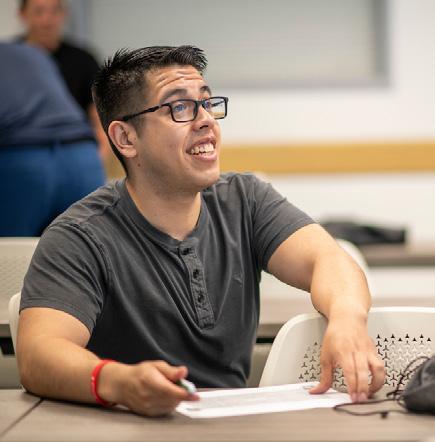
COLLEGE OF ENGINEERING
Anupama Kaul, Professor of Engineering Director of PACCAR Technology Institute
The Consortium on Sensing, Energy-efficient Electronics, Photonics with 2D Materials and Integrated Technologies (SEEP-IT) are receiving $1 million annually over the next five years, totaling $5 million, specifically from the Department of Energy (DOE) National Nuclear Security Administration (NNSA) Minority Serving Institution Partnership Program.
Why the Grant Matters:
“We wanted to push our technology forward to remain competitive economically and safeguard our national security, so we explored emerging semiconductors that offer new functionalities not possible with conventional materials,” said UNT PACCAR Professor of Engineering Anupama Kaul. “This consortium drives innovation with our team members across disciplines simultaneously working on different components of this research.” – Anupama Kaul
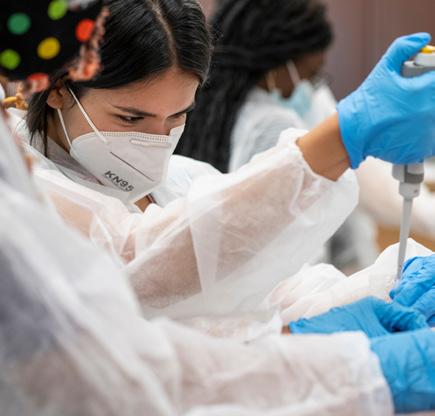
COLLEGE OF SCIENCE
Vanessa Macias, Assistant Professor of Biological Sciences
Dr. Vanessa Macias is using a $500K R15 grant from the National Institutes of Health (NIH), to investigate strategies to use genetically modified mosquitoes for applications to control vector-borne disease. The study will identify the breadth and impact of piRNA targeting in existing transgenic lines and lay the foundation to explore how the piRNA pathway in wild mosquitoes will respond to implementation of transgenic technologies to control mosquito-borne disease.
Why the Grant Matters:
“Transgenic mosquitoes are an exciting new approach to control diseases like Zika, dengue and malaria. With this grant, we are looking to understand how mosquitoes interact with the new genes that are introduced into their DNA.” – Vanessa Macias
7
PRINCIPAL INVESTIGATORS – NOTABLE AWARDS
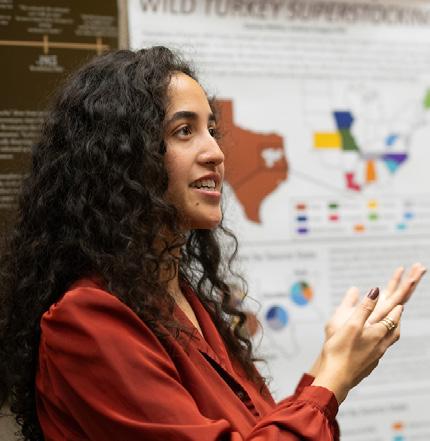
COLLEGE OF EDUCATION
Matthew Lemberger-Truelove, Professor of Counseling and Higher Education
Matthew Lemberger-Truelove, Peggy Ceballos and Dan Li in the Department of Counseling and Higher Education are looking to make systemic change in school-based mental health care with support from a $3.8 million grant from the U.S. Department of Education that was authorized by Sen. John Cornyn’s Bipartisan Safer Communities Act.
Why the Grant Matters:
“We know that counseling can have a profound impact in schools helping students to regulate their emotions, improve their attention and increase their feelings of connectedness, which all can contribute to better academic achievement. That’s why it’s important we act now to reduce the student to counselor ratios in our region, which currently stand above the 250 to 1 recommendation by the American School Counselor Association.”” – Matthew Lemberger-Truelove

COLLEGE OF LIBERAL ARTS & SCIENCES
Ateka A. Contractor,
Associate Professor of Psychology
Funded by the National Institutes of Mental Health, this nearly $450K R15 Grant will examine effects of and mechanistic targets underlying a novel PTSD intervention focused on narrating and detailing positive memoriesProcessing of Positive Memories Technique (PPMT).
Why the Grant Matters:
“Therapeutically, when trauma survivors recall prior positive experiences, they may integrate positive memories into their memory system which can result in a more balanced perspective in life, they may connect with positive feelings and thoughts that may help them to counter negative beliefs and to develop a broader emotional repertoire, and they may use positive memories for comfort and motivation during stressful times.” – Ateka A. Contractor
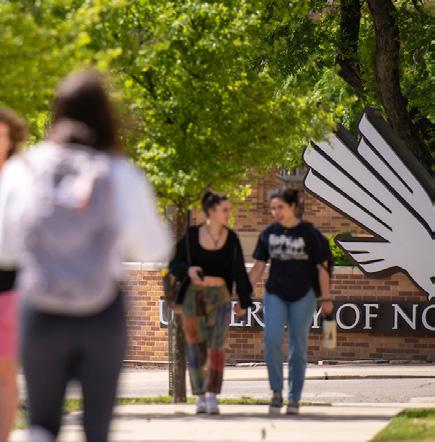
COLLEGE OF BUSINESS
David Nowicki, Professor of Logistics & Operations Management
Funded by the Texas Department of Transportation, State, for $1.5 million Nowicki’s research investigates Support for the Activities of the Border Trade Advisory Committee and Implementation of the Texas Border Strategic Transportation Blueprint.
Why the Grant Matters:
“Transportation infrastructure in Texas plays a vital role in facilitating the nation’s trade with Mexico. Given the current and projected travel demand, improving the capacity and operations of the existing multimodal infrastructure is critical to alleviate traffic congestion, facilitate international trade, e-commerce, reduce environmental impacts, and improve the quality of life for residents in the border region.” – David Nowicki
8
BY THE NUMBERS
Division of Research and Innovation Financial Resources
$23.35M
State Appropriations
Local (F&A)
Central Funds
Endowment & Restricted Gifts
Division of Research and Innovation Budget Allocation $16.28M
Research Centers**
Research Administration
Core Research Facilities
Faculty Startup
Research Institutes
Research Development
Other Research Support
**Research Center includes state appropriation for CAAAM
9
55.45% 20.36% 23.32% 0.87%
32.94% 30.25% 14.33% 8.58% 7.85% 4.69% 1.37%

Our Teams At-A-Glance
OUR LEADERSHIP
RESEARCH AND INNOVATION
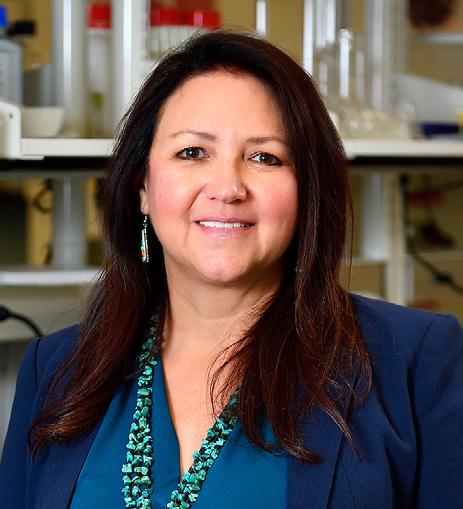
PAMELA PADILLA, PH.D. VICE PRESIDENT

ROBERTS, PH.D. ASSOCIATE VICE PRESIDENT
GRANTS & CONTRACTS ADMINISTRATION
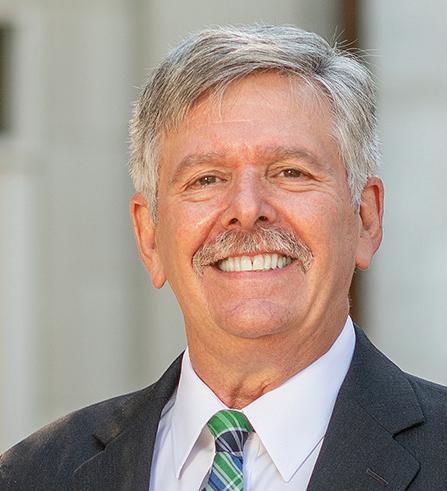
CHARLES TARANTINO ASSISTANT VICE PRESIDENT

ASSISTANT VICE PRESIDENT
RESEARCH COMMERCIAL AGREEMENTS

MICHAEL RONDELLI, JD ASSOCIATE VICE PRESIDENT
RESEARCH INTEGRITY & COMPLIANCE

PINCKARD SR. DIRECTOR

DIRECTOR
11
AARON
BRENDA L. BARRIO, PH.D.
AUTUMN
SARAH ROMACK
RESEARCH DEVELOPMENT
Key Successes
The Research Development team provides strategic and capacity-building activities and resources to UNT researchers to seek and secure external funding. The team had a successful year in 2023, seeing a 35% increase in activities over the academic calendar. Initiatives included the Washington DC Fellows Program, workshops with funding agencies, proposal development workshops, and bi-monthly funding opportunity training for faculty.
Proposals: FY23: 637 submitted – $298M
Awards: FY23: 315 awards – $86M
FY18: 487 submitted – $216M
FY18: 213 awards – $32M
FY21-23: > 35% increase in research development activities for the UNT community (60 initiatives including:)
• Workshops
Trainings
• DC Fellows
• Limited Submission Reviews
• Research Creativity Awards
• Seed Grants
• University Research Day
Proposal Managers (FY23) Core Facilities (FY23)
Institutes:
• Advanced Environmental Research Institute (AERI)
• Advanced Materials and Manufacturing Processes Institute (AMMPI)
• BioDiscovery Institute (BDI)
• Jim McNatt Institute for Logistics Research (JMI) Colleges:
• College of Health and Public Service (CHPS)
• College of Information (COI)
• College of Science (COS)
• Generated $300k revenue
• Student training
• New fee schedules (Greenhouse Core Research Facility)
• Renovations
12
4 Greenhouse Core Research Facility 4 Materials Research Facility 4 BioAnalytical Facility • Personnel changes 4 Genomics Center 4 High Performance Computing
GRANTS & CONTRACTS ADMINISTRATION
Key Successes
• The number of proposals submitted in FY23 increased 9.8% from FY22.
• Oversight and management of $48,379,585 in FY23 sponsored projects expenditures, a 21.6% increase from FY22.
• Implemented an automated cost sharing process in the ledgers to provide faculty with live cost sharing and direct project expenditure information via the Grants Work Center.
• Implemented the Huron Effort Reporting System.
• Filled all open positions in Post Award.
• Initiated research administrator meetings with new format.
RESEARCH INTEGRITY AND COMPLIANCE
Key Successes
• The UNT Institutional Review Board (IRB), which oversees the safety and protection of human subjects in research conducted by faculty, staff and students, received a record number of submissions (1,008).
The RIC team reviewed 1,094 International Affiliations disclosures in FY23.
• The UNT Conflict of Interest (COI) program, which oversees the functions of the COI committee and the COI disclosure process, managed a 58% increase in submitted disclosures submitted for FY23.
• In FY23, the Institutional Biosafety Committee (IBC) and IACUC increased online trainings to faculty, staff and student researchers through the CITI platform. These committees provide local review and oversight for specific research laboratory and teaching labs.
• The RIC team responded to increasing federal agency guidelines for training and research security.
13
RESEARCH COMMERCIAL AGREEMENTS
4 Sponsored research, outside of the grant process, utilizes the contract process and the RCA’s team serves the research contracting needs of the university. This FY23 over 135 faculty and staff, from nine colleges and eight administrative divisions, were engaged with research contracts.
4 Technology Transfer serves the entire UNT community and in FY23, the RCA team worked with over 30 faculty and 40 students to protect and commercialize intellectual property developed at UNT.
4 RCA manages 144 active technologies in the UNT intellectual property portfolio.
14
Contracts Executed 676 651 678 Contracts Reviewed 777 789 776 Confidential Disclosure Agreements 96 122 109 Material Transfer Agreements 29 33 31 FY23 Disclosures 35 41 45 Patents Filed 52 43 60 Patents Issued 10 12 9 Licenses/Options 7 12 35 New Startups 1 1 1 4 FY23 New Disclosures
Contracting
Commercialization Metrics
Key Successes
Metrics
FY22 FY21 FY23 FY22 FY21
INSTITUTES OF RESEARCH EXCELLENCE
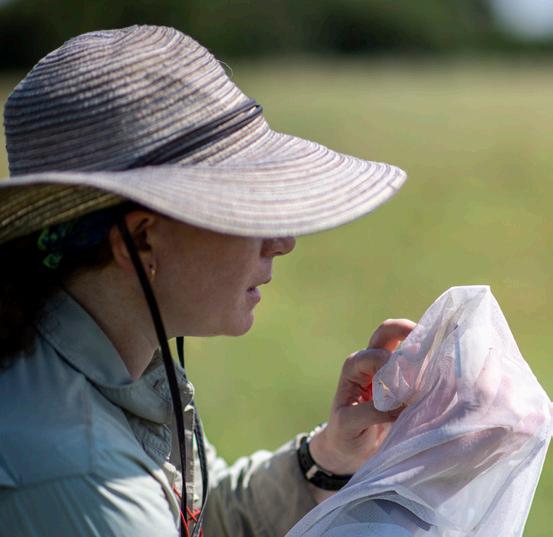
Advanced Environmental Research Institute — Over FY23, AERI increased its membership to 39 faculty members and broadened its disciplinary diversity to include six colleges and twelve departments. In line with growth in the Institute membership, there was an increase in grant proposal submissions for AERI members by more than 25% to 78 proposals, compared to the previous year, including 27 trainee submissions (post-doctoral, graduate, or undergraduate level), which totaled over $22 million in funding. AERI awards totaled nearly $4.5 million in FY23. Furthermore, AERI faculty members Dr. Jaime Baxter-Slye and Dr. Michael Thompson were awarded $77,500 by the Diamond Eagle Society toward the development of the Diamond Eagles Community and Learning Area, which includes construction of a covered pavilion, observations dock, signage, and accessible walkway at the UNT Pollinative Prairie. Over FY23, AERI also increased engagement with external stakeholders, including enhanced industry and government partnerships. One of these partnerships involving the City of Lewisville and AERI Associate Director Dr. Lauren Fischer and Dr. Lu Liang garnered regional recognition through a CLIDE award for developmental and planning excellence.

Advanced
Materials
and
Manufacturing
Processes Institute —
The Advanced Materials and Manufacturing Processes Institute (AMMPI) reorganized its membership by adding an associate director, Wonbong Choi from Department of Materials Science and Engineering, an original member from 2016. AMMPI also reorganized and formed its leadership teams to include a both a six-member leadership team along with a 14-member team. The mission of AMMPI is to test, develop and process next-generation structural materials via rapid combinatorial assessment and advanced processing technologies. The institute seeks to drive the development of functional materials for energy conversion and storage, optoelectronics, sensors and structural and environmental monitoring.
15
INSTITUTES OF RESEARCH EXCELLENCE

BioDiscovery Institute — BioDiscovery Institute — Research in the BioDiscovery Institute (BDI) delivers fundamental research solutions to support the nation’s bioeconomy. BDI had a busy FY23. BDI hosted Dr. Maureen McCann, Director of the National Renewable Energy Laboratory, as part of the Institute’s Distinguished Lecture Series, and welcomed a new member, Assistant Professor Dr. Patrick Horn, to its team. Research from BDI was featured in 11 media releases and appeared in more than 60 scientific publications. BDI researchers continue to be among the most highly cited authors in their respective disciplines and supported their collective research efforts with more than $4.3M in expenditures. Research is supported by numerous agencies including the National Institutes of Health, the National Science Foundation , the US Department of Agriculture, the US Department of Energy, Cotton Incorporated and the W.M Keck Foundation.

Jim McNatt Institute for Logistics Research (JMI) — The Jim McNatt Institute for Logistics Research (JMI) expanded to more than 40 researchers from across six colleges during the past year. Researchers submitted 42 proposals requesting $29M proposals to federal sources and 10 to non-federal. As a result of these proposal submissions, $1.6M was awarded. The institute jointly funded the Center for Integrated Intelligent Mobility Systems (CIIMS) with the Dean of the College of Engineering to advance the study of unmanned aerial vehicles (UAVs), autonomous ground vehicles (AVs), and UAV to AV communications. JMI continuously offers seed grants to support the formation of multidisciplinary teams pursuing externally funded, NRUF eligible grant opportunities. Future plans include pursuit of a U.S. Department of Transportation University Transportation Center and collaborative research between NASA and the Choctaw Nation of Oklahoma in the areas of UAVs, AVs and increasing supply chain resiliency. In addition, the institute continues to maintain a research office in Austin manned by two research professors conducting research in support of the Texas Department of Transportation.
16
RESEARCH CENTERS
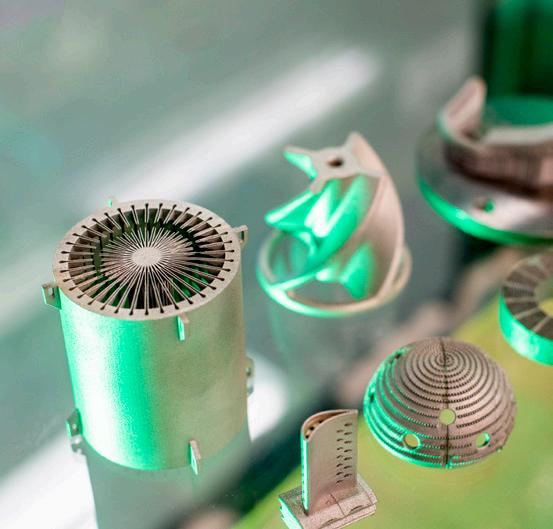
Center for Agile and Adaptive Additive Manufacturing (CAAAM) —
UNT’s CAAAM has positioned Texas as a leader in additive manufacturing innovation and workforce development. Many innovations now are feasible through CAAAM’s synergistic approach involving computational processes, materials modeling and in-situ and ex in-situ process, materials analysis/diagnostics along with data and decision sciences and machine learning sciences. The center is poised to forge innovative interdisciplinary collaborations across a multitude of science and engineering aspects of additive manufacturing including cybersecurity, data and decision sciences, complex logistics and supply chain, and high-performance computing. Additionally, the center works to address acute shortages in the manufacturing workforce by empowering companies to embark on additive manufacturing innovation and create industryresearch partnerships with regional and multinational manufacturing industries and their partners to meet the needs of public, private, federal and defense industry domains. These research and industrial collaborative activities have resulted in generating nearly $12 million in external funding.
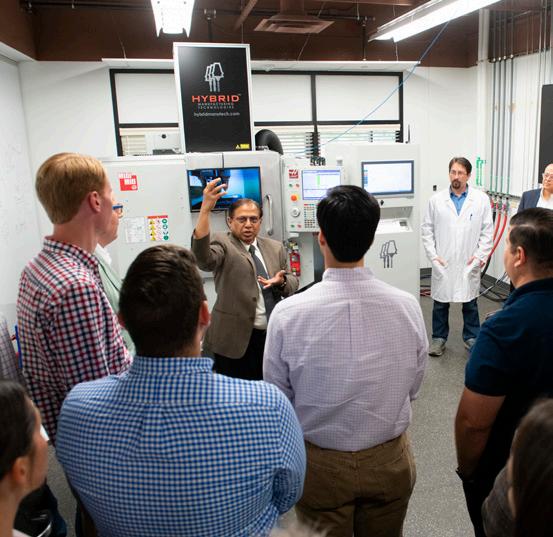

Center for Integrated Intelligent Mobility Systems (CIIMS) —
The university is encouraging integrated, intelligent mobility systems such as connected and autonomous vehicle research, spanning several disciplines including engineering, business, science, information, and health and public service. Researchers and students are working collaboratively on the complexities inherent in the field, including the technology itself, the data collection that helps drive its development and planning, and the policy and business practices necessary to support it.
Center for Racial and Ethnic Equity in Health and Society (CREEHS) —
CREEHS works to increase the overall quality of life for all Texans and to foster an environment for economic growth and innovation by narrowing longstanding racial and ethnic gaps in health care. Grounded in a biosocial frame of the determinants of health, CREEHS and its community partners investigate health quality, health policy and related systems by examining the economic, social and environmental factors that have contributed to health disparities.
INSTITUTES OF RESEARCH EXCELLENCE
17
RESEARCH CORE FACILITIES
Core research facilities, available for researchers across the university’s campus on a fee-for-service basis, are under the management of Aaron Roberts, associate vice president of research and innovation. The cores are designed to increase access to facilities for all UNT researchers and supports future development of cross-college and cross-departmental collaboration.
BioAnalytical Facility — Featuring state-of-the-art mass spectrometers with advanced capabilities for separating and quantifying small molecules and macromolecules.
Genomics Center — The Center provides experimental design and consultation support, consultation support, sample quality determination, and analysis services in NextGen sequencing and other molecular tools.
Greenhouse Support Services Facility — Includes three major greenhouses: one on the roof of the Life Sciences Complex, one outside the Science Research Building and another at Discovery Park.
High-Performance Computing Services — Provides support and consultation services for research computing needs and serves as a liaison for researchers with the Texas Advanced Computing Center in partnership with the University of Texas at Austin.
Materials Research Facility — Researchers from across the UNT campus and beyond use the more than two dozen instruments at the university’s MRF laboratories to multi-dimensionally fabricate, characterize and analyze a wide range of materials. Numerous projects bring in millions of dollars in research funding and span numerous areas of expertise in disciplines such as engineering, materials science, physics, chemistry and biology. The facility offers a suite of powerful analytical instruments used for true 3D characterization and processing with an adjoining cleanroom so that materials can be synthesized, tested, and controlled in close proximity.




18
“The groundbreaking work of UNT faculty, sta, and student researchers is transforming and improving the world around us. It’s been a remarkable year at UNT, and the accomplishments of our research community contributed significantly to that success, with record awards and consistent research growth. I am truly proud of their hard work and commitment that continues to propel our university forward to serve and better our communities, the state of Texas, and our nation.”
“The groundbreaking work of UNT faculty, sta, and student researchers is transforming and improving the world around us. It’s been a remarkable year at UNT, and the accomplishments of our research community contributed significantly to that success, with record awards and consistent research growth. I am truly proud of their hard work and commitment that continues to propel our university forward to serve and better our communities, the state of Texas, and our nation.”
research.unt.edu





























